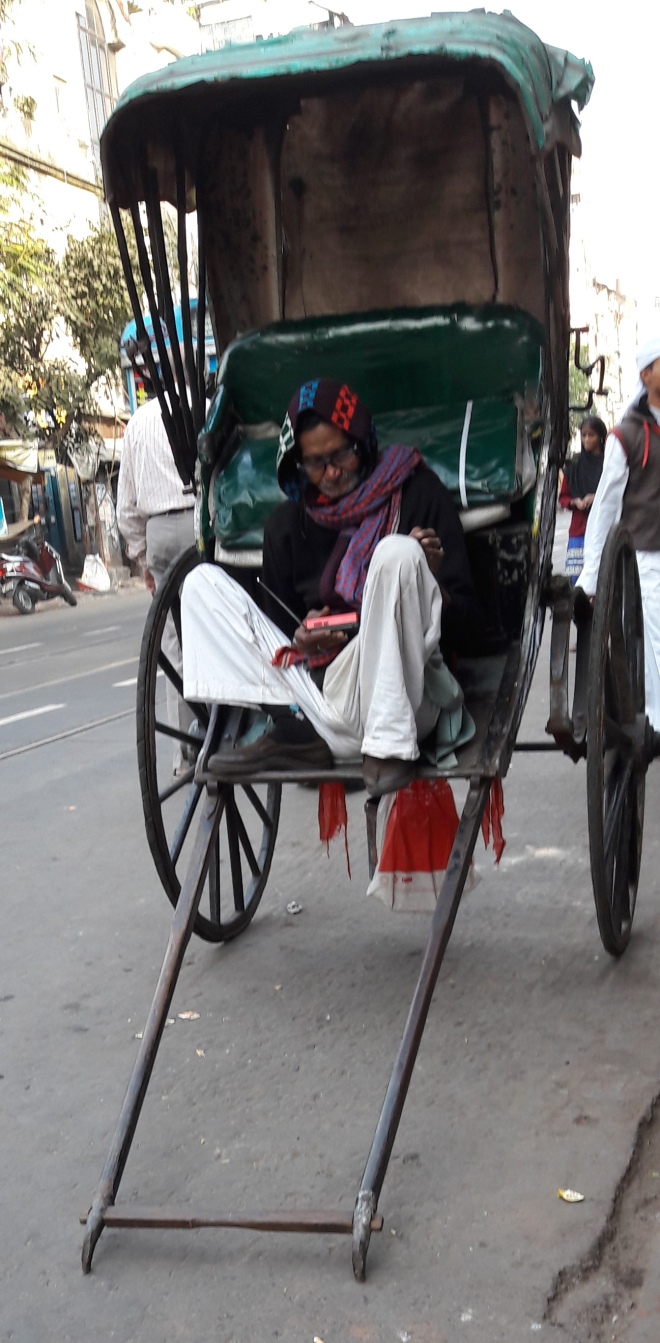
The rickshaw puller of Kolkata, the only city in India to have the hand pulled rickshaw. Muffled up to face the winter chill, he cannot quite hide his frail frame or toothless gums. He ‘enjoys’ a brief respite and fiddles with a pink radio, perhaps gifted by a doting daughter or grand-daughter.
The very concept of people physically lugging their counterparts around the city, often bare feet, is disturbing to say the least. Yet they continue to ply the streets of Kolkata providing a cheap and reliable transportation for short distances, especially convenient for schoolchildren. Which is not to say adults do not use them. They do and indeed even I have also utilized their services. Several years ago.
To ride or not to ride this anachronistic symbol of human degradation is a tricky question. We can easily take the moral high ground and shun them (like I do now). There are numerous other and indeed more convenient modes of transport. But the fact is that our ‘clear conscience’ is not going to fill their empty stomachs. They are eager to take you for a drive and idle time is not a matter of ‘enjoyment’ but a matter of concern.They may just have to go to bed hungry in order to honor our commitment to eradicating ‘social injustice’.
Looking at them, interacting with them, their fortitude, stoicism and innocent smiles as they battle the elements and extreme weather conditions – blistering summers, torrential downpours, flooded streets, chilly winds (and pay part of their meager earnings to battle their court case) – resilient is what comes to mind.
Along with respect and admiration.
Additional note: In 2006, the West Bengal State Government made arrangements to ban hand pulled rickshaws but concerns about their means of livelihood took the matter to court, where it is still stuck, mired in bureaucratic red-tape and political agendas. But a stop has been put on new registration of rickshaw pullers. Currently, there are reportedly about 6000 registered rickshaw pullers although according to some there are about 25,000 unregistered pullers. There is some talk of battery-operated rickshaws but that is still to see the light of day. But implementing these is also not a simple matter. Those who have been running the streets for 50 years are not too keen on learning new techniques at their age.
Till the hand pulled rickshaw is completely phased out or they are rehabilitated, I for one would advise visitors to try the rickshaw. With a rider. Please do not haggle with the pullers.
Thanks for visiting – would love to know your reactions, comments and suggestions.
What a hard life. Thank you for an enlightening post~
LikeLiked by 1 person
Thank you Cindy for reading
LikeLike
Beautifully written. One of those simple yet complex issues. It seems like a very tough job as you describe so eloquently… especially dealing with severe weather and the physical demands of the job. And yet, their livelihood. Without which they go hungry. Many too elderly to start over or find another type of job. This is what they do, day in day out.
Very thoughtful post. I really enjoy reading you.
Peta
LikeLiked by 1 person
Thank you Peta. You made my day 🙂
LikeLiked by 1 person
Beautifully written!
LikeLiked by 1 person
Thank you 🙂
LikeLiked by 1 person
A good read. I have heard about the Indian political and bureaucracies and how things can take ages to be resolved. I pity the people who are trying to earn a living.
LikeLiked by 1 person
Some elements in society would take many years to change, reminds me of the persons who salvage daily at the city dumps yet insist that it’s their only means of survival despite all the other avenues that governments have created for them… A very good post. Thanks for sharing…
LikeLiked by 1 person
Yes that’s so true. People are very resistant to change, even if it might be for the better.
LikeLiked by 1 person
It’d be hard to ride … but they need money. I do think it is society’s responsibility to help these people.
Great post for the theme.
LikeLiked by 1 person
Thanks Amy
LikeLike
I was surprised to learn there were still so many rickshaw pullers in the city. I’ve seen rickshaws before in Kyoto in Japan, but they were entirely for tourists (both foreign and Japanese), the pullers looked young and fit, and the prices were high. (From memory, something like $60 for 20 minutes.) It was really more like a personalized tour than a taxi service. The situation and the ethics of using the rickshaws sound much more complicated in Kolkata.
LikeLiked by 1 person
Yes it is a complicated issue. Thanks for visiting 🙂
LikeLiked by 1 person
For a society to advance, it has to adopt better means and replace old systems. While we can do our bit to help small vendors by buying from them or using their services, they should realize it wont last and adapt to change. Also, its govt. responsibility to show them alternate avenues to make a living.
A more recent example in hyderabad is extensive usage of ola and uber cabs instead of autos. The sooner autowallas understand this change, the better for them.
A good thought provoking post Dahlia. It indeed is s tricky situation.
LikeLiked by 1 person
Yes things can only improve if the other party is willing to accept and adapt to the options offered. Thanks Sampada for sharing your views 🙂
LikeLike
Rickshaw pullers were common during old times….wonder what different happened in Calcutta that they still ply on her streets while they withdrew from the rest of the country in phases
LikeLiked by 1 person
Yes, I have seen them in Mussorie as well but no longer – apparently there is a section of people who think Kolkata wouldnt be Kolkata without them!
LikeLiked by 1 person